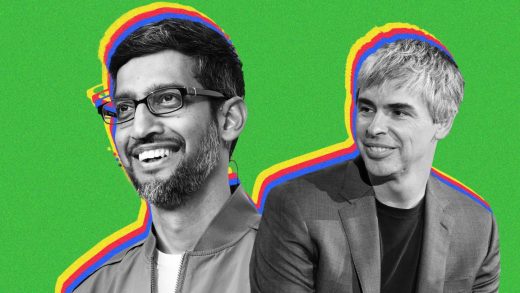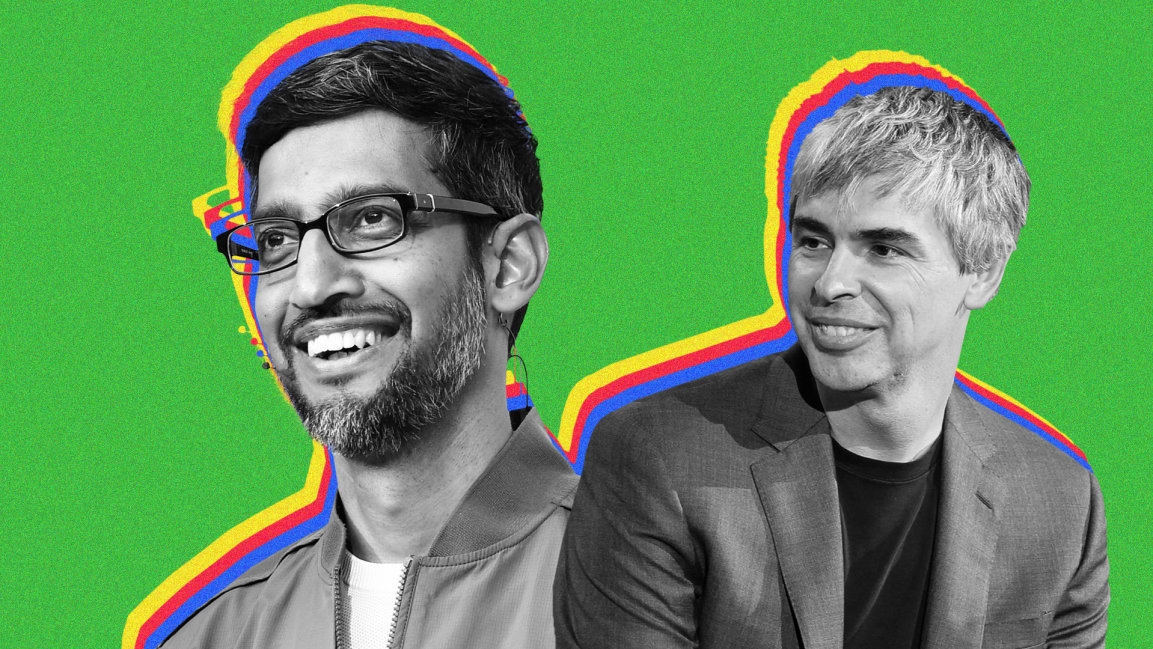Culture—not products or moonshots—is Sundar Pichai’s biggest challenge
The last time that Larry Page tweaked his job responsibilities at Google—by creating a new holding company called Alphabet and focusing his energy on “moonshot” projects while Sundar Pichai ran Google—it was one of the most genuinely shocking moments I can remember in big-tech history. Four years later, Page is stepping down as Alphabet CEO, with Pichai succeeding him in that role as well as keeping his post at Google. Along with cofounder Sergey Brin, Page is abandoning his executive role but staying on Alphabet’s board. And though the timing is a surprise, the move itself feels inevitable.
After all, Page has long opted out of many of the tasks typically shouldered by the CEOs of large companies, such as being a primary public face. (I talked to him for a Time magazine cover story back in 2013, not knowing that it would be one of the last interviews he’d grant to members of the press.) Last year, when the Senate Intelligence Committee called him to testify about Russian interference in U.S. politics, he declined to appear.
Behind the scenes, rather than getting deeply involved in Alphabet and Google’s moving parts, Page has spent much of his time instigating others—such as Pichai and the heads of various arms of Alphabet—to think big and spend some of the vast profits the company makes from advertising, its primary source of revenue. Google’s cofounders retain voting control over Alphabet, which means that Page and Brin will still have the ability to prod others to scale up their ambitions. Page can even throw around his weight in more specific ways if he chooses. He just won’t have anyone on his back for failing to be a more conventional CEO.
Meanwhile, there’s no reason to expect immediate radical change from Pichai, who has been Google’s CEO since the creation of Alphabet four years ago. He’s already put his imprint on Google through moves such as emphasizing AI as its core asset and unifying its formerly far-flung hardware efforts in one group. The latter move was particularly meaningful given Google’s long-standing tendency to let various groups operate as fiefdoms and pursue their own passions—which, though a boon for creativity, isn’t the most efficient way to run an enormous company.
Pichai first made his name at Google as product manager for the Google Toolbar, an add-in that was pretty darn mundane—but also essential back in the days when Microsoft’s Internet Explorer ruled the web and Google didn’t have a browser of its own. Then he went on to spearhead the Chrome browser and Chrome OS, two products so ambitious—with competition so entrenched—that most companies wouldn’t even have given them a shot. The fact that both went on to have a major impact on the world is proof that Pichai is a rare talent—part fearless dreamer, part nuts-and-bolts product person. It couldn’t be more obvious why Page identified him as a worthy successor.
Twenty-one years into the history of Google/Alphabet, its culture feels as fragile as it ever has.”
Even if Pichai chooses to give wide latitude to the leaders of such Alphabet moonshot efforts as its Waymo self-driving cars and Verily life sciences arms, freeing up time for his new responsibilities will presumably require him to push down some responsibility at Google. With experienced Googlers on tap such as Anil Sabharwal, who leads Chrome and other products, that should work out okay.
And yet, Pichai has his work cut out for him on multiple fronts. In Google’s early days, Page and Brin didn’t just devise a really good search engine. They also created the culture that allowed Google to attract all-star talent, enter new markets at a dizzying clip, and fill the lives of a billion-plus people with products that meet what Page has called the toothbrush test: They’re things you use every day.
Twenty-one years into the history of Google/Alphabet, that culture feels as fragile as it ever has. Revelations about the company doling out millions of dollars to executives accused of sexual harassment make everyone involved look terrible, and led to a mass employee walkout. Googlers have also expressed alarm about projects such as a censored search engine for the Chinese market (which Google now says it has no plans to launch). In just the past few weeks, the company has scaled back its iconic weekly all-hands meetings—apparently in part to avoid discussion of touchy topics—and faced protests by employees who fear that it has abandoned its values and targeted staffers for expressing dissident opinions. (A protest organizer was among four recently fired staffers, though Google says they were terminated for violating data-security rules.)
The days when the Googleplex looked like a Fantasyland protected from real-world concerns are over. No amount of drool-worthy free food and other perks can change that. And Pichai must saddle some of the blame for current woes given that he has been in charge at Google throughout the Alphabet era.
Still, it doesn’t seem hopelessly unrealistic to think that he might help Alphabet overcome some of its current cultural challenges, which were years in the making and therefore will take time to overcome. When the company lives up to its ideals, it does its best work. So he has every reason to try to nudge it in the right direction—and with Page and Brin out of the management picture, the buck stops with him.
(24)



